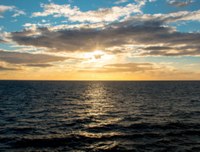
A considerable fund for sustainably enhancing aquaculture in Europe. This is what NewTechAqua is aiming for. This European project is coordinated by the Department of Veterinary Medicine at the University of Bologna.
A kickoff meeting for NewTechAqua was held in Bologna a few days ago. The project sees the participation of 26 partners (universities, research centres, institutions and private enterprises) from 9 different countries, and can count on a Horizon 2020 funding of 6 mln euro. Representatives of FAO (the United Nation's Food and Agriculture Organization) and of the Federation of European Aquaculture Producers, as well as experts from Turkey, Israel and Algeria attended the kickoff meeting.
Aquaculture consists of farming fish, mussels and seaweeds in controlled environments. At present, aquaculture is responsible for 20% of the European fishery production, an industry employing approximately 85 thousand people. 10 years from now, the European Union is looking to significantly increase aquaculture, with the aim of reaching the goal of 4.5 mln tonnes of fish products a year. Sustainability, however, remains a central commitment.
NewTechAcqua (New Technologies and Strategies for a Sustainable, Resilient and Innovative European Aquaculture) sets out to achieve this goal. The researchers involved in this project will work for 4 years, creating and subsequently testing aquaculture technologies which will have to be resilient, sustainable and able to expand and diversify the European production of fish, mussel and micro-algae. The project includes themes such as aqua-feed, technologies for the 4.0 industry, sustainable farming techniques, methods of genetic improvement, new types of farming and foodstuff.
Among other things, researchers will develop new types of biological and carbon-neutral feed-stuff. Moreover, they will work on how to employ Artificial Intelligence for improving the current systems of pest control, and expand technologies for enhancing the environmental sustainability of fish and mussel farms. Innovative methods of farming aimed at the achievement of higher quality fish, mussel and micro-algae will also be developed. Finally, an investigation into new techniques for obtaining sustainable high-quality fish products through the optimization of production scraps will be carried out.
Before being fully implemented in the industry, the businesses involved in the project will test these innovations. Mowi, the biggest salmon-farming company in the world, is among the participants of NewTechAqua, and so is Cromaris, a Croatian fish farm which currently is the leading fish producer in the Adriatic Sea. The Italian company Aia-Veronesi will also participate in the project by mainly focusing on the development of new feed-stuff that are able to foster the health and wellbeing of Mediterranean-farmed fish.
